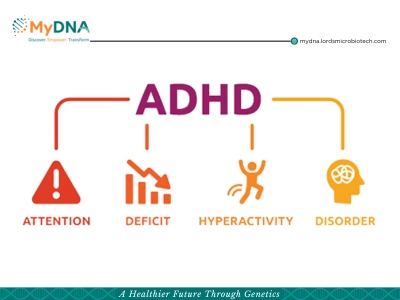
Understanding the Genetics of ADHD Attention deficit hyperactivity disorder (ADHD) is a common neurodevelopmental condition that affects millions of children and adults worldwide.The symptoms of impulsivity, hyperactivity, and inattention are what define ADHD. The prevalence of children ever diagnosed with ADHD increased by 42% between 2003 (7.8%) and 2011 (11.0%). Males had a consistently higher prevalence of ADHD than females. Some people may primarily suffer from inattention, which makes it difficult for them to focus, organize their work, or obey directions. Some people may be hyperactive and impulsive, which can lead to restlessness, impulsive decision-making.
Family Linkage
Research strongly suggests a hereditary component to ADHD. Studies on twins show a high concordance rate, meaning if one twin has ADHD, the other has a significantly increased risk of developing it as well. Family studies also reveal a pattern – children with a parent or sibling diagnosed with ADHD are much more likely to have it themselves.
Complexity of ADHD
Unlike some conditions caused by a single gene mutation, ADHD is believed to be polygenic. This means multiple genes, each with a small influence, interact to increase susceptibility.
Here are some of the genes that have been linked to ADHD:
- Dopamine transporter (DAT1) gene: This gene regulates the dopamine system, which is involved in attention, focus, and reward processing.
- Dopamine receptor D4 (DRD4) gene: This gene is another important player in the dopamine system. Certain variations of this gene have been associated with an increased risk of ADHD.
- Serotonin transporter (SERT) gene: Serotonin is a neurotransmitter involved in mood regulation and impulse control. Variations in the SERT gene have also been linked to ADHD.
- FOXP2 gene: This gene is important for speech and language development. Mutations in FOXP2 have been linked to both ADHD and language disorders.
While genetics play a significant role, Environmental factors can also influence the development and expression of ADHD. Prenatal exposure to toxins, childhood trauma, and even diet can have significant impact on the individual with the condition.
The genetic link to ADHD doesn't mean it's inevitable. If you have a family history of the condition, it's wise to be aware of the signs and symptoms. Early diagnosis and intervention can make a big difference in managing ADHD effectively.
A few misconceptions about ADHD:
- ADHD is only a lack of discipline: Despite what the general public believes, ADHD is more complex than just a lack of willpower or discipline. It is a neurological disorder influenced by both hereditary and environmental factors.
- ADHD is limited to children: Although it is frequently identified in childhood, ADHD can continue throughout adolescence and maturity. Even though many adults did not receive a diagnosis when they were younger, they now deal with symptoms that impact different areas of their lives.
- Medication is the only available treatment: Medication is not the only choice for treating ADHD symptoms, even though it can be a useful aid in managing them. In addition to behavioral therapy, organizational techniques, lifestyle modifications, and support systems are helpful in the management of ADHD.
- People with ADHD lack intelligence: Intelligence is unaffected by ADHD. In actuality, a lot of people with ADHD have special talents including creativity, inventiveness, and problem-solving skills.
Assisting with ADHD:
- Education and Awareness: Getting educated on ADHD can help debunk myths and lessen stigma for both oneself and others. Communities that are aware of the difficulties and assets related to ADHD are more empathetic and supportive of one another.
- Individualized Strategies: Since everyone with ADHD is affected differently, it's critical to create individualized symptom management plans. This could entail using organizational tools, creating routines, breaking things down into smaller pieces, and setting reasonable goals.
- Medication Management: For those who choose to pursue medication, working closely with healthcare professionals to find the right medication and dosage is essential. Regular monitoring and adjustments may be necessary to optimize treatment outcomes.
- Behavioral Therapy: Cognitive-behavioral therapy (CBT) and other forms of psychotherapy can help individuals with ADHD develop coping mechanisms, improve time management skills, and address co-occurring conditions such as anxiety or depression.
- Support Networks: Making friends with people who also have ADHD or attending support groups can offer empathy, encouragement, and useful advice on how to deal with day-to-day difficulties. Local support groups, online networks, and therapeutic groups can provide helpful links and motivation.
In summary
Due to its complexity and variety, ADHD has to be managed and supported in a comprehensive manner. People with ADHD can flourish and realize their full potential by accepting empowerment techniques, dispelling myths, and comprehending the facts of the condition.